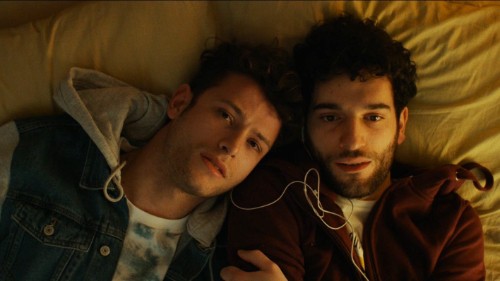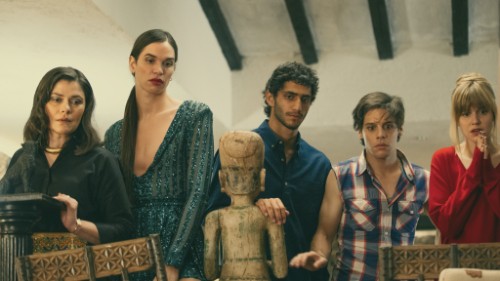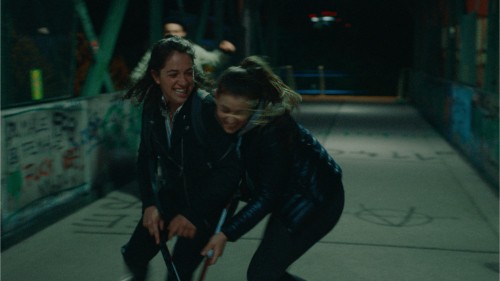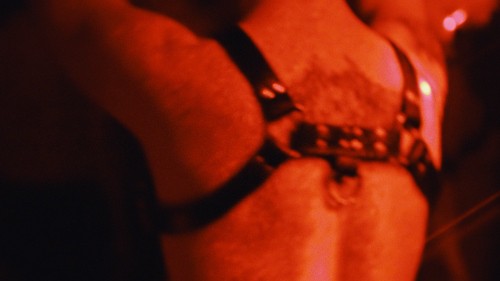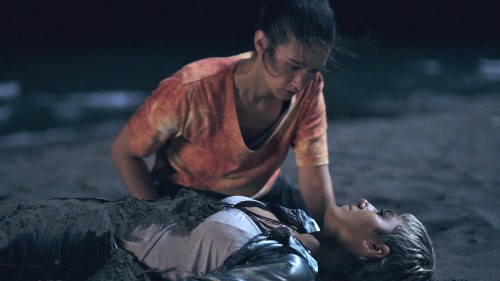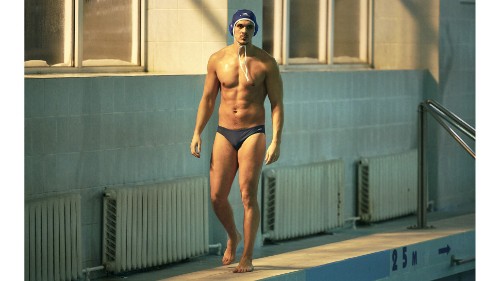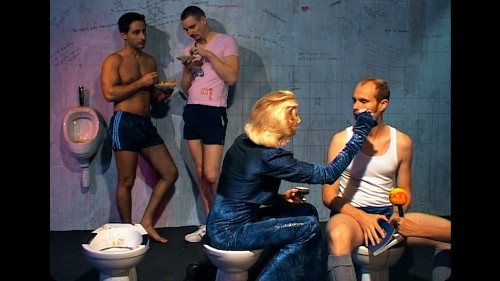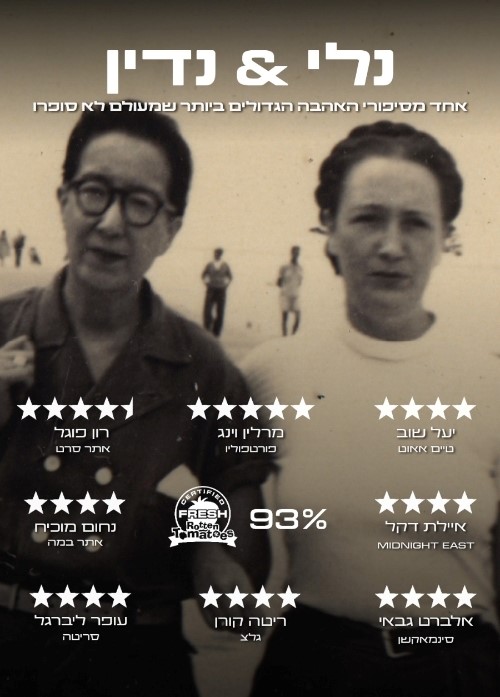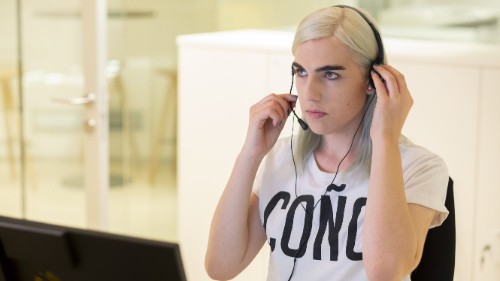In the sunny Sanita quarter of Naples, Italy, a working-class neighbourhood, where everyone knows each other, two inseparable friends live in a protected bubble until their friendship is put to the test.
Mario (Vincenzo Antonucci) and Lino (Francesco Pellegrino) are two young men, born and raised in Sanita. They still never left the city to explore the world. When Lino’s younger sister convinces the locals she’s a saint, who can perform miracles, and gains their admiration, Lino’s destiny changes abruptly. Free from the financial responsibility for his mother and sister, he is able to imagine a life outside the slums for the first time. Meanwhile, Mario is experiencing an increasing attraction towards his best friend which he didn’t notice before now.
Director Silvia Brunelli’s debut film is Italian cinema as we love it: funny, bold and housing a plethora of colourful and humane characters. This is a film that confronts us with the differences between sacred and secular, old world and new world.
Dodo
“Dodo” is the new film by Greek master Panos H. Koutras, who brought us queer groundbreaking Greek films such as “Strella” (2009 TLVFest opening film) and “Xenia” (that screened during the 2015 TLVFest).
This time Koutras delivers a surprising melodrama, full of twists and highly entertaining. Dodo is the name of a bird that had been extinct for over 300 years. One night the bird mysteriously appears in a fancy villa of a down on its luck Athenian family. In two days they will celebrate the wedding of their daughter – a wedding that is critical to saving the family’s bleak financial situation. The presence of the long extinct bird rattles the family, the villa’s staff and others who cross its path.
Imagine the early 80’s great soap operas “Dallas” and “Dynasty” meet an extinct Dodo, throw into the mix queer characters and lots of plot twists and you get the very entertaining melodrama “Dodo”.
Additional screenings:
28.10, 19:45 Haifa Cinematheque
4.11, 21:00 Cinematheque Herzliya
Breaking the Ice
29.10 and 30.10 screenings include Q&A with the director
Director Clara Stern’s debut film “Breaking the Ice” premiered at the 2022 Tribeca Festival. In this film Stern brings to the screen a story of what happens when someone with a very rigid and uncompromising view on life meets the exact opposite – the side she yearns to live and experience.
Alina Schaller is Mira, who sometimes seems to be carrying the weight of the entire world on her shoulders. She’s the captain of a women’s ice hockey team and the heiress to the barely financially surviving vineyard. She is taking care of her grandfather, whose Alzheimer is progressing rapidly, and her younger, irresponsible brother, Paul, returns home after being gone for a long while.
When a new, spontaneous, free-spirited young woman joins the team, Mira finds herself being swept into a surprising and freeing affair, maybe even more freeing than she can actually afford to have.
“Breaking the Ice” is a romantic sport drama about the freedom to be who you are with no limitations.
Additional screening: Rosh Pina Cinematheque 2.11, 20:30
Jerusalem Cinematheque, 2.11 – 19:00
In association with the Austrian Cultural Forum

The Last Chapter
Bernard is a French man on the verge of his twilight years, he is moving into a new apartment, probably his last. Director Gianluca Matarrese documents without any filters himself and his much older lover. He is documenting them reminiscing and having sex, playing control and submission games, master and slave. A young and curious filmmaker and his older BDSM fan lover, who lost his greatest love during the AIDS pandemic of the 80’s and suddenly, years later, found himself falling for a younger man. What at first started out just as a sexual adventure, turned out to be much more.
This is a film about the generation gap, friendship, life, death, sex, love adn dealing with the fast approaching inevitable end .
“The Last Chapter” is a courageous, unfiltered documentary.
Viewing is 18+ due to explicit sex scenes.
In association with the French Institute
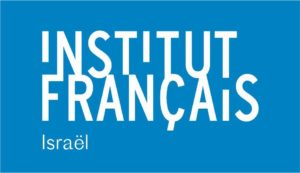
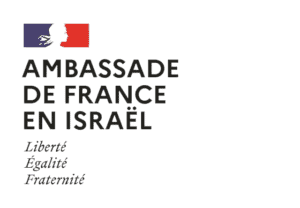
Wet Sand
“Wet Sand” is the second feature film by Georgian director Elene Naveriani. It deals in a very delicate and moving way not only with the homophobia engrained in the Georgian society, but also with the generation gap between the older closeted queers and the younger generation who refuses to hide.
In a quaint fishermen’s village, on the shores of the Georgian Black Sea, live friendly people who are sure that they know each other well. One day, Eliko, one of the village elders, is found hanged. His androgenous looking granddaughter Moe, a city girl, arrives at the village in order to organise her grandfather’s funeral. She clearly doesn’t fit in the conservative community that sees her as an outsider, but the locals fake a warm reception. Moe befriends the old tavern owner who used to be very close with her grandfather and the village spinster bartender working for him. The more Moe delves into the mystery that is her grandfather’s life, the more she uncovers the web of lies and the tragic consequences of Eliko’s secret love life.
Pay attention to the perfect and addictive soundtrack, which will surely send you straight to Spotify to look for the songs afterwards.
Additional screening: 3.11, 20:30 Cinematheque Herzliya
The Revenge of the Shiny Shrimps
A sequel to the successful 2019 dramatic comedy “The Shiny Shrimps”.
This time the queer water-polo team are on their way to Japan, to take part in the LGBT games in Tokyo, when their plane is detained in the heart of Russia, in a particularly homophobic area. The fun trip to Japan turns into a life changing experience that will give the protagonists a new perspective on their reality.
This is an unusual sequel that chooses to confront the merry French bunch that is living a fairly safe and free life in Paris with the hard reality that is the lives of LGBT people living in East Europe. The team is facing many troubles they have never faced before, such as the dangers of using Grindr in Russia, an incarceration in a conversion camp, and raging and violent homophobia.
The scenes set in Russia were actually shot in the Ukraine, and some of the Ukrainian actors who played Russian characters had found themselves later fighting against the Russian invasion.
In association with the French Institute


Klappe
3.11 – after screening Q&A with the director
4.11 – director in attendance.
German cinematographer and TLVFest favorite, Jürgen Brüning, delivers a shameless masterpiece that took 16 years to complete. He is mixing up pieces of his works as a director and producer (on films he produced for Bruce La Bruce and Shu Lea Cheang amongst others) and unreleased footage he has taken years ago, all wildly edited together. Brüning weaves into the narrative countless references to global pop culture.
“Klappe” project (which means “public toilets” or “Tea rooms”) was written and partly filmed in 2006 and was shelved due to lack of time by the busy producer. The forced break from his work due to the COVID epidemic allowed Brüning and editor Jörn Hartmann to return to the ambitious project and finish it. In the time since the beginning of the project the two had grown up, developed and found new topics of interest. “Klappe” is an indescribable idiosyncratic film. An experimental queer cinema that is anti-religious, anti-authoritarian and somehow just anti everything! The result is subversive, pornographic, social, political, revolutionary and perhaps, mostly, a romantic musical that is nostalgic of the time when queer cinema was ground breaking and smashed conventions.
Viewing is 18+ due to explicit sex scenes.
Nelly & Nadine
VOD screening is AVAILABLE ONLY IN ISRAEL.
.
להסבר על אופן הזמנת סרט לחצו כאן. בכל בקשה או שאלה ניתן לפנות למייל זה [email protected]
.
The voice of Nelly, an opera singer, is ringing out in the middle of Ravensbruck concentration camp. Nelly and Nadine first met
on Christmas 1944 in the hell of the concentration camp and there started a relationship that would change their world. Nelly Mousset-Vos, was an opera singer in Paris, who used to frequent Natalie Clifford Barney’s literary salon in the 30’s. Nadine Hwang was the rebellious daughter of the Chinese ambassador to Spain. Sylvie, Nelly’s granddaughter, discovers a diary, 8mm film clips and audio tapes in a locked box belonging to her grandmother. She pieces together the unbelievable, bigger-than-life love story of Nelly and Nadine. For a whole year, Swedish acclaimed director Magnus Gertten (“Only the Devil Lives without Hope”) accompanies Sylvie in her search for the untold stories of her grandmother Nelly and her lover Nadine. The result is a moving documentary about a deep, loving relationship. This is an unforgettable memoir of two women who were determined to be truly free, as well as a reminder of the need for individual and collective remembrance.
My Emptiness and I
Directed with rare sensitivity and compassion “My Emptiness and I”, director Adrian
Silvestre’s second feature film, is following a young transgender woman living in Barcelona and working an unsatisfying job at a call center. She yearns for “normal romance” and for a man who would love her the way she is. She fantasizes of a sweeping romance with handsome men and of starting a traditional family. As it turns out, reality is much more complicated and she experiences a series of embarrassing dates while also dealing with her physical transition.
Director Adrian Silvestre accompanies her daily life, as she talks candidly with co-workers, queer friends and men she meets through dating apps, while trying to find her place in the world.
The main character, portrayed by Raphaelle Perez (who also co-wrote the script), seems to exude vulnerability and naiveté with gazes full of longing.
Screening in cooperation with The Gila Project for Trans Empowerment
